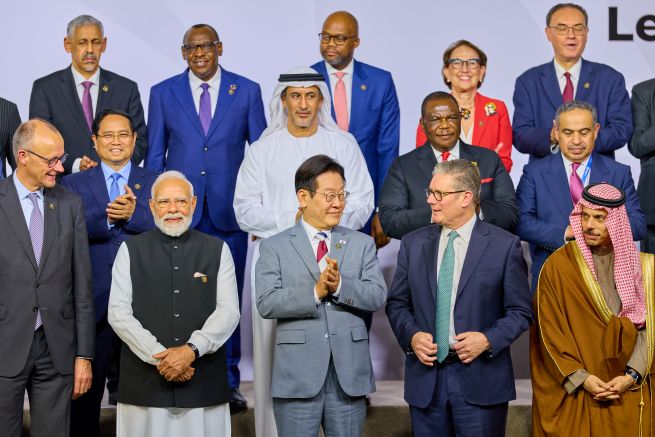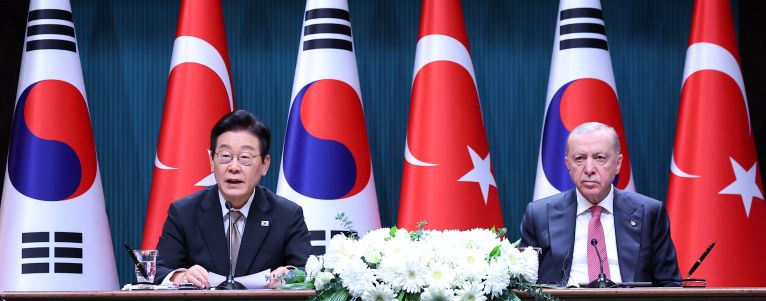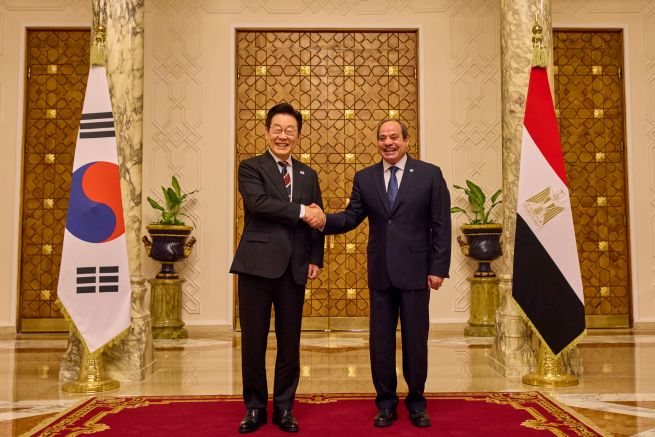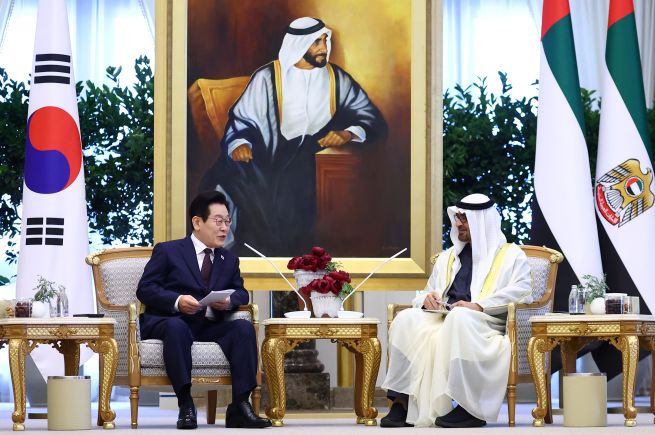
President Lee Jae Myung (C, front row) poses for a photo with leaders of the Group of 20 during a photo session at the Nasrec Convention Center in Johannesburg, South Africa, on Nov. 22, 2025. (Pool photo) (Yonhap)
ANKARA & SEOUL, Nov. 25 (Korea Bizwire) — President Lee Jae Myung’s recent four-nation trip — anchored by his appearance at the G20 summit in Johannesburg and followed by stops in the United Arab Emirates, Egypt, and Turkey — was less a ceremonial swing through diplomatic capitals than a quiet attempt to reposition South Korea within a rapidly unsettled world economy.
For Lee, the itinerary served as a map of emerging fault lines. The traditional architecture of global trade is shifting, and the gravitational pull of the Global South — that broad constellation of nations across Africa, the Middle East, Latin America, and the Caribbean — is growing stronger. Seoul, long dependent on the U.S.–China binary, is looking for additional anchors.
At the G20, Lee pressed for a revival of the multilateral trading system once stewarded by the World Trade Organization, now adrift amid nationalist policies and fractured supply chains.

President Lee Jae Myung delivers a joint press statement with President Recep Tayyip Erdogan at the Turkish presidential palace in Ankara on November 24 (local time).
He framed climate change as a shared global burden and urged member states to treat access to artificial intelligence technologies not as a competitive advantage but as a global public good — a stance that subtly reflects South Korea’s ambivalence as both a tech exporter and a mid-sized power vulnerable to technological concentration.
His most pointed message concerned critical minerals. As Washington and Beijing escalate their tug-of-war over rare earths, Lee called for a supply chain that is “stable” and “mutually beneficial,” a diplomatic turn-of-phrase that masks a hard strategic truth: South Korea’s advanced industries cannot function without a diversified and predictable mineral base.
If Johannesburg offered a stage for Lee’s multilateral ambitions, the subsequent bilateral visits revealed the pragmatic core of his diplomacy.

President Lee Jae Myung (L) shakes hands with Egyptian President Abdel Fattah El-Sisi ahead of their summit at the presidential palace in Cairo on Nov. 20, 2025. (Pool photo) (Yonhap)
South Korea Looks Beyond the Superpowers in Lee’s Strategic Courtship of the Global South
In Abu Dhabi, the president presided over the signing of seven agreements spanning artificial intelligence, nuclear energy, aerospace, and health care — sectors that tie South Korea’s industrial strengths to the UAE’s outsized investment appetite.
The flagship announcement was a framework for strategic AI cooperation under the UAE’s Stargate initiative, a massive data-center cluster carrying an initial global investment of roughly 30 trillion won. A 200-megawatt facility is expected to go online next year, a reminder of how swiftly the Gulf states are constructing their post-oil futures.

President Lee Jae Myung (L) holds a summit with United Arab Emirates President Mohamed bin Zayed Al Nahyan presidential palace in Abu Dhabi on Nov. 18, 2025. (Yonhap)
Defense cooperation featured prominently. Lee and President Mohamed bin Zayed Al Nahyan discussed moving beyond traditional arms sales toward joint development and co-production — a transition that could reshape the economics of South Korea’s defense industry. The presidential office placed the potential economic benefit around $15 billion.
Turkey offered a parallel logic. Building on past collaboration around Ankara’s Altay main battle tank, which incorporates South Korean K2 technology, Lee and President Recep Tayyip Erdogan agreed to expand cooperation in defense and nuclear energy.
A new MOU on nuclear cooperation sets Seoul up to compete for Turkey’s planned second nuclear power plant in Sinop, an infrastructure project with deep symbolic and geopolitical stakes on the Black Sea.
Egypt, meanwhile, provided the broadest canvas for South Korea’s ambitions. In Cairo, Lee and President Abdel Fattah El-Sisi explored cooperation on infrastructure on a scale unusual for a Korean president, including projects tied to Gaza’s eventual reconstruction and a more than $2 billion expansion of Cairo International Airport.

President Lee Jae Myung poses for a group photo with G20 leaders and heads of international organizations at the Nasrec Expo Centre in South Africa on November 22 (local time).
From right to left: Pablo Quirno, Argentina’s foreign minister; Faisal bin Farhan Al Saud, Saudi Arabia’s foreign minister; Keir Starmer, prime minister of the United Kingdom; President Lee Jae Myung; Narendra Modi, prime minister of India; Friedrich Merz, chancellor of Germany; Emmanuel Macron, president of France; Mark Carney, prime minister of Canada; João Lourenço, chair of the African Union (AU); Cyril Ramaphosa, president of South Africa and this year’s G20 chair; Luiz Inácio Lula da Silva, president of Brazil; Anthony Albanese, prime minister of Australia; Li Qiang, premier of China; António Costa, president of the European Council; Ursula von der Leyen, president of the European Commission; Gibran Rakabuming Raka, vice president of Indonesia; Sanae Takaichi, prime minister of Japan; Recep Tayyip Erdoğan, president of Turkey; Edgar Abraham Amador Zamora, Mexico’s deputy finance minister; and Maxim Oreshkin, deputy chief of staff to the Russian president.
It was here that Lee unveiled the SHINE initiative — stability, harmony, innovation, network, education — an aspirational blueprint aimed at rooting South Korea more firmly in Middle Eastern economic architecture.
Taken together, Lee’s travels reflect a broader recalibration: an attempt to widen the geography of South Korean diplomacy at a moment when the global system is fragmenting and mid-sized powers are beginning to improvise.
Whether this constitutes a durable strategic shift or simply an opportunistic season of outreach remains unclear. But the trip marks South Korea’s most explicit effort yet to treat the Global South not as an abstract diplomatic slogan, but as a set of partners capable of reshaping its economic future.
M. H. Lee (mhlee@koreabizwire.com)
